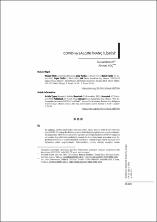| dc.contributor.author | Bulut, İsmail | |
| dc.contributor.author | Koç, Ahmet | |
| dc.date.accessioned | 2022-05-10T07:08:25Z | |
| dc.date.available | 2022-05-10T07:08:25Z | |
| dc.date.issued | 2022 | en_US |
| dc.identifier.citation | Bulut, İ., Koç, A. (2022). COVID-19 Salgını İnanç İlişkisi. Dinbilimleri Akademik Araştırma Dergisi 22 (1) : 281-312. | en_US |
| dc.identifier.issn | 1303-9199 | |
| dc.identifier.uri | https://doi.org/10.33415/daad.1027706 | |
| dc.identifier.uri | https://hdl.handle.net/11491/8342 | |
| dc.description.abstract | Bu çalışma, 2020 yılında bütün dünyayı etkisi altına alan ve hâlâ devam etmekte olan COVID-19 salgını ile dinî inanç arasındaki ilişkiyi tespit etmeyi amaçlamaktadır. Bu kapsamda- Hitit Üniversitesi’nde öğrenim gören öğrencilerin COVID-19 salgınını ve bundan kaynaklı tıbbi, psikolojik, sosyal vb. durumları inanç açısından nasıl değerlendirdiklerini ve inancın hastalık üzerindeki etkisini tespit etmek amacıyla 344 öğrenciye anket uygulanmıştır. Katılımcıların vermiş olduğu cevaplar analiz edildiğinde salgının açıklanma biçiminin nedensellik ilkesi çerçevesinde, bireylerin sosyal, kültürel ve ekonomik durumları doğrultusunda heterojenlik gösterdiği saptanmıştır. İnsan-din ilişkisinde salgın ve doğal afetler gibi olağanüstü durumların etkisinin kaçınılmaz olduğu görüşü dile getirilmiştir. Dinî bağlamda açıklamalar, nedensellik ilkesini destekler niteliktedir. Dinsel söylem, insan sağlığı ve dünya odaklı yaşam sürmeye karşılık salgın gibi felaketlerin ibret, ceza ve hikmet bağlamında değerlendirilebileceğini öne sürmektedir. Elde edilen bilgiler ışığında katılımcıların, -virüsün insanlar tarafından laboratuvar ortamında üretildiğini düşünseler dahi- değişmez ve yazılı bir kader anlayışına sahip oldukları, virüsün Allah'tan gelen bir imtihan olduğu düşüncesini taşıdıkları görülmüştür. Katılımcıların salgın karşısında geliştirdikleri tutumlar üzerinde yetiştikleri kültürün ve çevrelerinden edindikleri dinî inancın ve aldıkları dinî eğitimin önemli rol oynadığı, aynı zamanda bireyin dinî yaşantısının, eğitim düzeyinin ve yaşadığı çevrenin olaylara bakış açısını etkilediği görülmüştür. | en_US |
| dc.description.abstract | This study aims to determine the relationship between the COVID-19 and religious belief. In this context, a questionnaire was applied to 344 students with the "COVID19-belief relationship scale" in order to determine how the students of Hitit University, Corum evaluate the COVID-19 virus and the resulting medical, psychological, social, etc. situations in terms of belief. In our study, the data obtained from the questionnaire were analyzed with the quantitative analysis method using SPSS. Considering the answers given by the participants, it has been determined that the way the epidemic was explained showed heterogeneity within the framework of the causality principle and in line with their social, cultural, and economic conditions. It has been expressed those impacts of situations such as epidemics, and natural disasters are inevitable in the human-religion relationship. Explanations in the religious context support the causality principle. Religious discourse suggests that disasters such as epidemics can be evaluated in the context of warning, punishment, and wisdom instead of living a life focused on human health and the world. In the light of the information obtained, it has been observed that even if the respondents had the idea that humans were producing the virus in a laboratory environment, they had an unchanging and written understanding of destiny, thus even if the virus was artificial, it was a test from God. It was seen that the culture in which the participants grew up and the religious belief they acquired from their environment played an essential role in their evaluation of the epidemic-type situations, and at the same time, the religious life of the individual, the level of education and the environment they lived affected the perspective of the events | en_US |
| dc.language.iso | tur | en_US |
| dc.publisher | Dinbilimleri Akademik Araştırma Dergisi | en_US |
| dc.relation.ispartof | Dinbilimleri Akademik Araştırma Dergisi | en_US |
| dc.rights | info:eu-repo/semantics/openAccess | en_US |
| dc.subject | Kelam | en_US |
| dc.subject | COVID-19 | en_US |
| dc.subject | Koronavirus | en_US |
| dc.subject | Salgın | en_US |
| dc.subject | İnanç | en_US |
| dc.subject | Din | en_US |
| dc.subject | Kalam | en_US |
| dc.subject | COVID-19 | en_US |
| dc.subject | Coronavirus | en_US |
| dc.subject | Pandemic | en_US |
| dc.subject | Faith | en_US |
| dc.subject | Religious | en_US |
| dc.title | COVID-19 ve İnanç İlişkisi | en_US |
| dc.title.alternative | The Relationship between COVID-19 and Faith | en_US |
| dc.type | article | en_US |
| dc.department | Hitit Üniversitesi, İlahiyat Fakültesi, Temel İslam Bilimleri Bölümü | en_US |
| dc.authorid | 0000-0002-8588-1585 | en_US |
| dc.identifier.volume | 22 | en_US |
| dc.identifier.issue | 1 | en_US |
| dc.identifier.startpage | 281 | en_US |
| dc.identifier.endpage | 312 | en_US |
| dc.relation.publicationcategory | Makale - Uluslararası - Editör Denetimli Dergi | en_US |
| dc.contributor.institutionauthor | Bulut, İsmail | |
| dc.contributor.institutionauthor | Koç, Ahmet | |
| dc.identifier.doi | 10.33415/daad.1027706 | en_US |


















